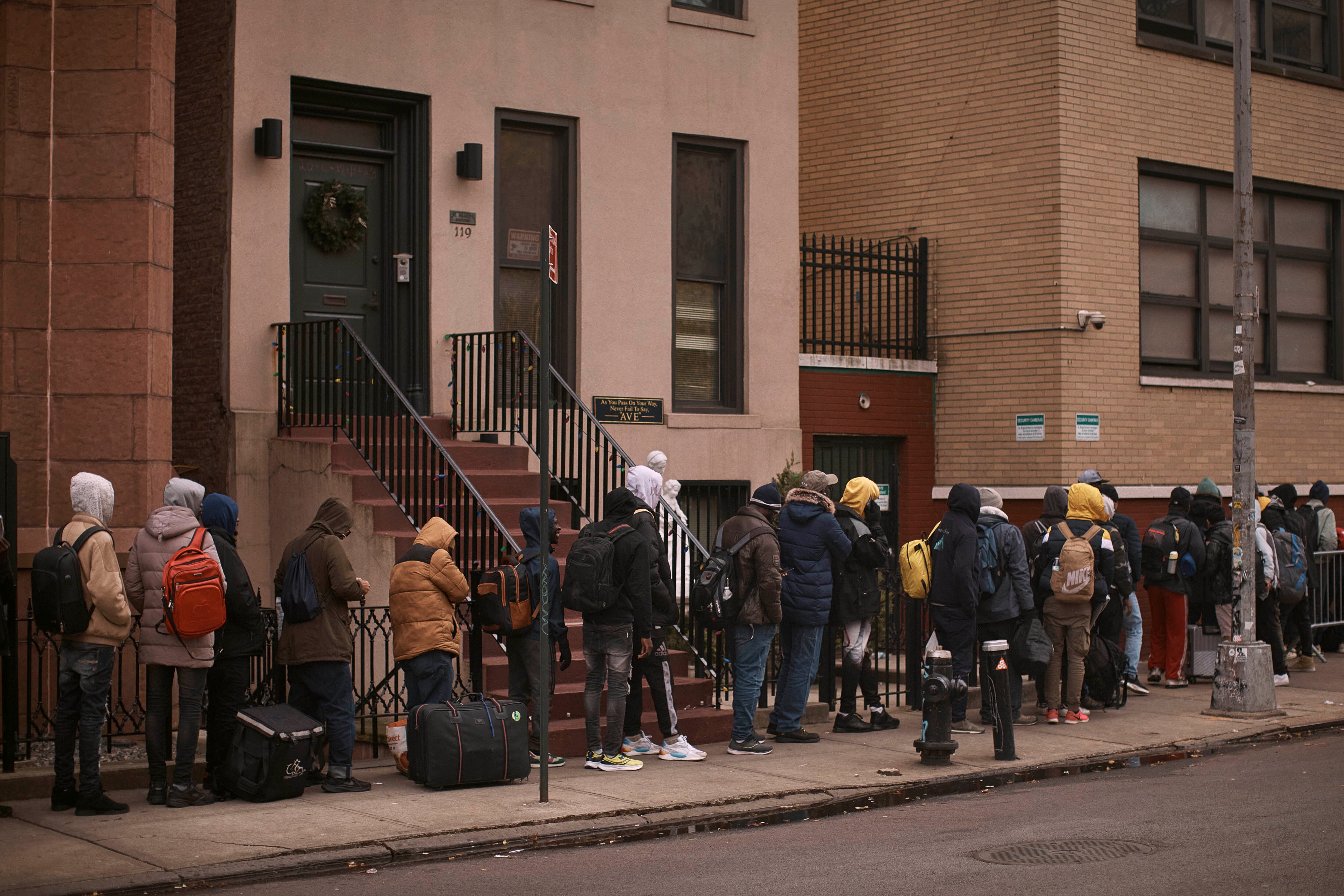New York City won't offer 'right to shelter' to some immigrants after 30 days in deal with advocates
Some homeless adult immigrants in New York City will no longer be offered shelter after their first 30 days in the city under an agreement between the mayor and city human rights advocates

Your support helps us to tell the story
From reproductive rights to climate change to Big Tech, The Independent is on the ground when the story is developing. Whether it's investigating the financials of Elon Musk's pro-Trump PAC or producing our latest documentary, 'The A Word', which shines a light on the American women fighting for reproductive rights, we know how important it is to parse out the facts from the messaging.
At such a critical moment in US history, we need reporters on the ground. Your donation allows us to keep sending journalists to speak to both sides of the story.
The Independent is trusted by Americans across the entire political spectrum. And unlike many other quality news outlets, we choose not to lock Americans out of our reporting and analysis with paywalls. We believe quality journalism should be available to everyone, paid for by those who can afford it.
Your support makes all the difference.Some immigrants in New York City could be formally denied emergency housing after officials and human rights advocates agreed to compromise on the interpretation of a unique legal decision that gives the “ right to shelter ” to anyone who asks, the mayor announced Friday.
Mayor Eric Adams asked a court in October to suspend the housing requirement in a state of emergency, drawing a challenge from The Legal Aid Society and another humanitarian group. The agreement essentially ends the blanket right to shelter for adult immigrants after the first 30 days they receive services. But it entrenches their right to some protections.
The city can determine on a case-by-case basis whether to allow a migrant to stay in a shelter for more than 30 days, according to the settlement. Additional time will be granted on a showing of “significant efforts to resettle,” which can include making an appointment with an immigration lawyer, applying for a resettlement program or proof that they're searching for housing.
“This new agreement acknowledges the realities of where we are today, affirms our shared mission to help those in need and grants us additional flexibility to navigate this ongoing crisis,” Adams said in a recorded video announcing the settlement.
In return, Legal Aid expects the city to clear a backlog of immigrants who are reapplying for shelter space. The city also agreed to eliminate the use of waiting rooms as shelters and provide consistent access to bathrooms, showers and food, according to a statement from The Legal Aid Society and the Coalition for the Homeless.
“This settlement safeguards the right to shelter in the consent decree, ensuring single adults’ - both long-time New Yorkers and new arrivals - access to shelter, basic necessities and case management to transition from shelter to housing in the community,” said attorney Adriene Holder for The Legal Aid Society in a statement.
The agreement requires the city to share data with The Legal Aid Society about how many migrants are in shelters and where they are staying. Holder said the group won’t hesitate to sue if the city doesn’t comply.
Adams said over 183,000 immigrants have been in the city’s care at some point since 2022. Under the agreement, the unfettered right to shelter would be restored if the humanitarian emergency ended. Roughly 60% of those migrants have been able to leave the system, Ana Almanzar, the city's deputy mayor for strategies, told reporters earlier this week.
New York City’s shelter requirement has been in place for more than four decades after the consent decree required the city to provide temporary housing for homeless people.
The announcement came after New York shelters began kicking immigrant families out of shelters after 60 days, forcing them to reapply in order to secure another shelter spot. Single adults have been evicted every 30 days, with some having to sleep on the streets or take shelter in subway cars. The settlement applies to adults seeking shelter, not families.
Constant address changes are an added strain for the many immigrants in the shelter who are applying for asylum, a step toward receiving legal permission to work. At an asylum court hearing Wednesday, a man from West Africa expressed surprise when a judge told him he had to submit a change of address in writing to the court within 5 days of changing addresses, even if he was moving every 30 days between shelters.
“It’s going to be a bit of a hassle for you,” immigration Judge Lori Adams said as she gave the man extra copies of the blue address forms.
___
This story has been updated to correct that it was single adult migrants, not families, who spent days without shelter.